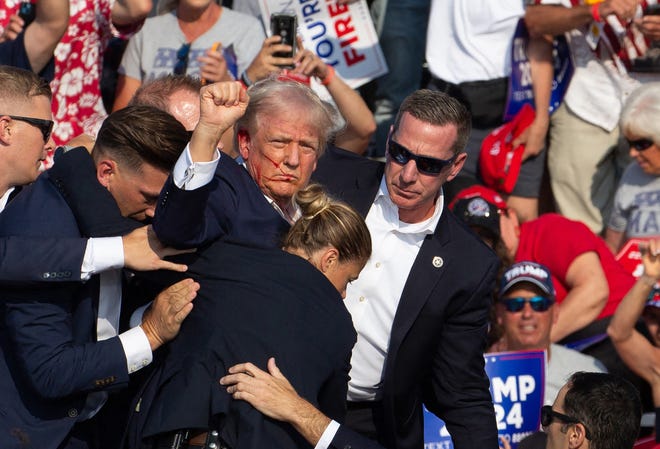R. Bruce Anderson
Political news, and people’s opinions on politics, have been completely overshadowed by the assassination attempt on former President Donald Trump.
The Republican National Convention in Milwaukee, one of the political events scheduled for this week, is not immune to this effect: It’s hard to have a conversation there, or anywhere, about politics (or anything else, really) without it coming to the forefront.
The shooting was horrific. It was a deadly attack on a candidate, an indiscriminate attack that left casualties in the crowd. A former firefighter died trying to protect his family from the gunfire. It was a deadly and brutal crime against the entire American community.
Oddly enough, I found out about this while I was walking around an outlet store in St. Augustine admiring plastic cups with flamingos on the sides. The first time this happened, a former student texted me asking if I knew anything about what happened or had any insight.
Of course, I didn’t know. All around me, others who heard the news felt the same disgust and confusion as I did. As details emerged, it became clear that the shooter had fired a barrage of bullets vaguely toward the podium, but that some of them had hit the crowd. “It could have been us,” I thought, and then, “It could have happened to anyone.”
The crowd in Pennsylvania likely included the same core of any political rally: ardent supporters of a candidate, undecideds who stopped by to hear a candidate speak and ordinary people who simply popped in on a whim to see who was in the public eye.
Here in Florida, we have a really great tradition of political “social gatherings” where candidates get together for a dinner hosted by a political party, a local car dealership, or the city. The candidates give speeches at set times and are allowed to say anything they want in support of their candidacy.
There are plenty of fond, sometimes humorous and even tragic memories from these events, when giving a candidate a platform could determine within five minutes whether their political careers were lit up or ruined forever.

In Alabama and Texas, it’s a political barbecue. In the late 1990s, a friend took me to one in Opelika, Alabama. The microphone broke, so the speaker had to yell. Supporters of each candidate competed to shout the loudest denunciation of their opponent, and the whole thing ended up being a friendly, rowdy affair.
Afterwards, of course, there was sweet iced tea, fried chicken and political talk.
These rituals were born in an era before television, radio, or even the Internet, and are also social occasions: imagine a farmer in the past parking his wagon, taking his family to “see the elephants,” enjoying food, drink, and socializing with neighbors.
The ugly truth:Changing candidates won’t solve the Democratic Party | R. Bruce Anderson
Fellow citizens. Community. Decisions to make.
We want to keep this practice healthy and alive because we need to hear these people’s honest opinions directly, without embellishment or embellishment. Few candidates in recent memory have embraced the spirit and reality of the “rally” as much as Donald Trump. His rallies are celebrations, social gatherings, festivals, and political events.
I’ve been there. I’ve taken my students. I may not like almost everything he says, but at least I heard it directly from him and not from some “pundit” on Fox News or CNN.

Last week’s shooting was brutal, but what made it so shocking was not because it happened so often, but because it’s so rare. I never have That’s what happens here: in some countries, violence and even assassination are part of the standard political toolkit.
Not here.
And it should never be that way.
R. Bruce Anderson is the Sarah D. and L. Kirk McKay Jr. Endowed Professor of American History, Government and Civics and the Miller Distinguished Professor of Political Science at Florida Southern College. He is also a columnist for The Ledger and a political consultant and on-air commentator for WLKF radio in Lakeland.

